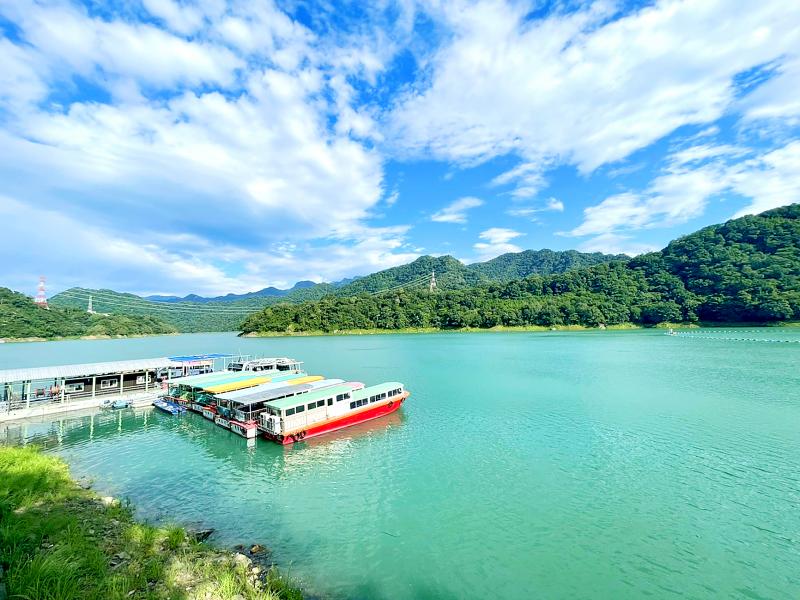As water levels at most reservoirs in Taiwan have risen due to rains over the past few weeks, the Ministry of Economic Affairs yesterday removed all water supply restrictions for Hsinchu and Chiayi counties, as well as Tainan, allowing farmers in these areas to plant rice for this year’s second harvest.
A water supply alert level for Taoyuan has also been downgraded from “yellow” to “green,” the lowest alert level, removing water restrictions for households, but requiring industrial users to reduce daily water consumption by 5 percent, the ministry said.
Taichung remains on “orange” alert, with limits on water use and reduced pressure, it said.

Photo: Lee Jung-ping, Taipei Times
Miaoli County remains on “yellow” alert, which means reduced water pressure, but no obligation for large users to reduce daily usage, it added.
As water resources for industrial and household use stabilize, the ministry said it would focus on the nation’s farmers, who still hope that they can plant rice for a second harvest after irrigation for the first harvest was largely impeded by restrictions in many areas.
Deputy Minister of Economic Affairs Tseng Wen-sheng (曾文生) said that the ministry would cautiously prioritize farmers in its distribution plan while ensuring sustainable levels at the nation’s reservoirs.
A Water Resources Agency survey showed that levels at some reservoirs have continued to rise, with Hsinchu County’s Baoshan Second Reservoir (寶二水庫) at 96 percent of capacity, Nantou County’s Sun Moon Lake (日月潭) at 98 percent, and Yunlin County’s Hushan Reservoir (湖山水庫) and Tainan’s Nanhua Reservoir (南化水庫) at full capacity.
Resources at most other key reservoirs have also been replenished, with the exception of Miaoli County’s Yongheshan Reservoir (永和山水庫), at 47 percent, and Taichung’s Techi Reservoir (德基水庫), at 34 percent.
“According to predictions from the Central Weather Bureau, we are going to see normal rains in July, slightly less than normal in August and slightly above average in September, so we can look forward to the water situation continuing to improve,” Tseng said.

Taiwan Semiconductor Manufacturing Co (TSMC, 台積電), the world’s biggest contract chipmaker, booked its first-ever profit from its Arizona subsidiary in the first half of this year, four years after operations began, a company financial statement showed. Wholly owned by TSMC, the Arizona unit contributed NT$4.52 billion (US$150.1 million) in net profit, compared with a loss of NT$4.34 billion a year earlier, the statement showed. The company attributed the turnaround to strong market demand and high factory utilization. The Arizona unit counts Apple Inc, Nvidia Corp and Advanced Micro Devices Inc among its major customers. The firm’s first fab in Arizona began high-volume production

VOTE OF CONFIDENCE: The Japanese company is adding Intel to an investment portfolio that includes artificial intelligence linchpins Nvidia Corp and TSMC Softbank Group Corp agreed to buy US$2 billion of Intel Corp stock, a surprise deal to shore up a struggling US name while boosting its own chip ambitions. The Japanese company, which is adding Intel to an investment portfolio that includes artificial intelligence (AI) linchpins Nvidia Corp and Taiwan Semiconductor Manufacturing Co (TSMC, 台積電), is to pay US$23 a share — a small discount to Intel’s last close. Shares of the US chipmaker, which would issue new stock to Softbank, surged more than 5 percent in after-hours trading. Softbank’s stock fell as much as 5.4 percent on Tuesday in Tokyo, its

The prices of gasoline and diesel at domestic fuel stations are to rise NT$0.1 and NT$0.4 per liter this week respectively, after international crude oil prices rose last week, CPC Corp, Taiwan (台灣中油) and Formosa Petrochemical Corp (台塑石化) announced yesterday. Effective today, gasoline prices at CPC and Formosa stations are to rise to NT$27.3, NT$28.8 and NT$30.8 per liter for 92, 95 and 98-octane unleaded gasoline respectively, the companies said in separate statements. The price of premium diesel is to rise to NT$26.2 per liter at CPC stations and NT$26 at Formosa pumps, they said. The announcements came after international crude oil prices

COLLABORATION: Softbank would supply manufacturing gear to the factory, and a joint venture would make AI data center equipment, Young Liu said Hon Hai Precision Industry Co (鴻海精密) would operate a US factory owned by Softbank Group Corp, setting up what is in the running to be the first manufacturing site in the Japanese company’s US$500 billion Stargate venture with OpenAI and Oracle Corp. Softbank is acquiring Hon Hai’s electric-vehicle plant in Ohio, but the Taiwanese company would continue to run the complex after turning it into an artificial intelligence (AI) server production plant, Hon Hai chairman Young Liu (劉揚偉) said yesterday. Softbank would supply manufacturing gear to the factory, and a joint venture between the two companies would make AI data